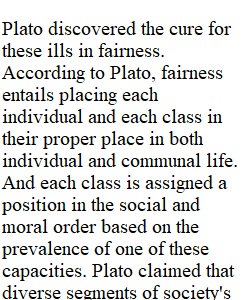


Q Discussion: Plato's Just Society 2020 unread replies.3636 replies. Plato notes in his dialogues what he believed to be the definition of particular abstract concepts such as "Justice"--The Republic, or Virtue (goodness)--The Meno. For example, in the Republic he states that in order to establish a Just Society, one must define Justice in an individual first, since a Society is made up of Individuals. Plato states that an individual is made up of three metaphysical parts (Tripartite Soul).n general terms, Plato drew parallels between the tripartite structure of the individual soul and body ("appetite-stomach", "spirit-chest" and "reason-head") and the tripartite class structure of societies. He divided human beings up, based on their innate intelligence, strength and courage, into: the Productive (Workers), laborers, farmers, merchants, etc, which corresponds to the "appetite-stomach"; the Protective(Warriors), the adventurous, strong and brave of the armed forces, which corresponds to the "spirit-chest"; and the Governing (Rulers or Philosopher Kings), the intelligent, rational, self-controlled and wise, who are well suited to make decisions for the community, which corresponds to the "reason-head". The Philosophers and the Warriors together are thus the Guardians of Plato's ideal state." Therefore, a Just Person is one who allows his Reason to govern his Spirit and Appetites and, if this is true in the individual, this is true for the society at large. If spirit or appetite takes over reason/judgment the individual is unjust, or performs unjust actions. If each individual in the society performs/functions according to his "innate" abilities and does not seek to rise above his position, then the society/republic will function justly. If the Reason--"intelligent, rational, self-controlled and wise, who are well suited to make decisions for the community" govern the Spirit-"adventurous, strong and brave" and Appetite--"laborers, farmers, merchants, etc.", a Republic will govern with Justice. Prompt: Do you agree with Plato that individuals should be placed into social or political positions based on their innate (inborn, genetic predisposition) ability, and should not seek to attain a higher or lower position in society. In other words, a requirement for leaders would be to have the ability to function with high intelligence and expertise, based on a genetic capacity for intelligence, or that an individual should be a solider because of their innate strength, courage, and bravery. or that a person whose strength is not based on intelligence or courage should seek more menial labor? Defend (agree and explain why), Challenge (disagree and explain why), or Qualify (I agree with some of the views, but not all) Plato's view.
View Related Questions